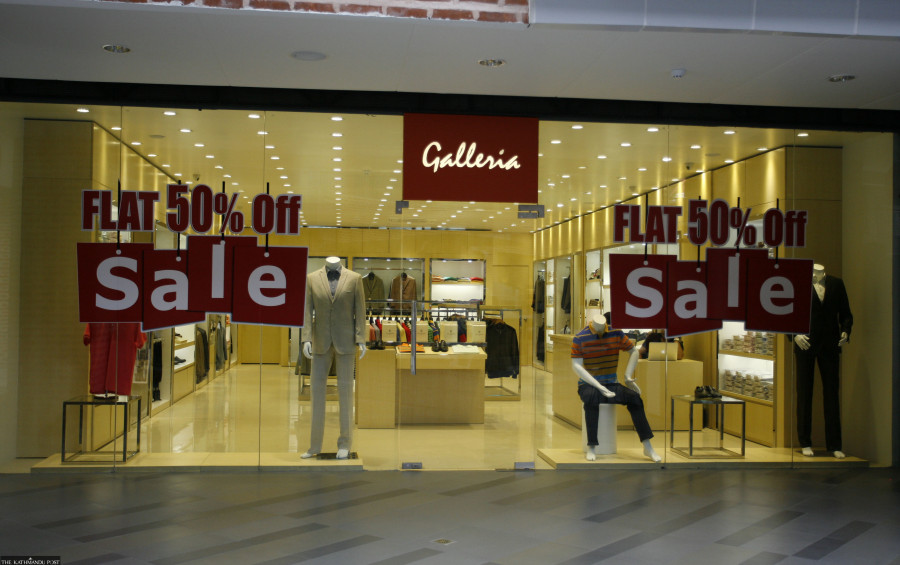Money
Economy relapsing after impressive post-Covid recovery, data shows
Nepal’s economy grew by 0.8 percent during the first quarter of the current fiscal year, the National Statistics Office said.
Krishana Prasain
In 2020, the initial shock of Covid-19 forced stores to close.
At the end of 2021, consumer spending recovered relatively quickly, and demand for bank loans increased sharply to record levels.
The recovery continued until the first half of 2022 when consumer spending spiked resulting in all-time high imports.
But in July 2022, new challenges arose—most notably, inflation.
Nepal's economy grew by 0.8 percent during the first quarter of the current fiscal year (mid-July to mid-October 2022), the lowest year-on-year growth in the past seven years, the National Statistics Office, formerly Central Bureau of Statistics, said.
And there’s no end in sight to the slowdown.
Many retailers who had high inventory levels were forced to slash prices to move excess stock out of their stores. But customers are still reluctant to step into shops despite all the discount offers being dangled in front of them.
Traders say many stores have either adopted a markdown strategy or shuttered.
“We assume business has declined by 50 percent since the beginning of the current fiscal year,” said Naresh Katuwal, immediate past president of the Nepal National Traders' Federation.
“Landlords have been raising shop rental fees sharply and unnaturally. At the same time, banks have increased interest rates to record levels. The option for many businesses was to shut down,” he said.
Traders are not the only ones having a hard time. They have been passing on the burden of the high cost of goods to consumers.
Gopal Bhusal, who works in a private company, and his wife Gita were stunned to hear the prices of summer goods when they went shopping last Thursday.
“Despite the markdowns, prices are still exorbitantly high,” said Gita. “We purchased a mosquito net, a bathing towel, and a kg of lentils at New Road and Asan which cost us Rs2,000 altogether,” she said.
“We had planned to buy some summer clothes and bedsheets, but they were so expensive. So we decided to buy household essentials only and returned home.”
Laxmi Sapkota Chhetri, owner of Elegant Fashion, a women's clothing store at Bishal Bazaar, New Road, said she was shooing flies nowadays.
“There is no business at all. People are not coming. Sometimes I don’t get even a single customer,” said Chhetri who has been running the shop since 2016.
Summer clothes used to be in high demand at this time of the year.
“We have surplus inventory, but the business is not even 10 percent of what it was before,” said Chhetri.
Not only banks, cooperatives too have stopped providing loans, traders say.
The national census 2021 report shows that among the 14.98 million Nepalis engaged in economic activities, 1.87 million (12.5 percent) are in the wholesale and retail trade.
“Nepal has not officially gone into a recession till now, but economic growth has slowed to a crawl,” said Pushkar Bajracharya, professor at the School of Management, Tribhuvan University.
“Yes, there is a downturn in the market. The hike in interest rates has resulted in high costs for the economy,” said Bajracharya.
“It has been more than one and a half years since the market faced a liquidity crisis, and the central bank adopted a policy to hike rates to bring money back to the banks,” he said.
“The rates on credit, too, increased significantly as a result. There was no economic activity, and the market has been in the doldrums.”
He says that interest rates need to come down more.
According to Katuwal, the government has not been able to spend the capital budget on time.
“A few people are holding the money, and it is obvious that the market will see a cash shortage. Many people have lost their jobs. There are no buyers due to lack of money.”
Economists say that hordes of Nepalis, mostly students and migrant workers, are leaving the country, all because of the slowed economy and lack of jobs at home.
"Economic activities will not increase unless interest rates are brought down further. The private sector has started lying off employees and cutting salaries, and there could be larger consequences in the coming days,” Bajracharya said.
“The government needs to spend more to bring back market confidence,” he said.




 9.6°C Kathmandu
9.6°C Kathmandu















